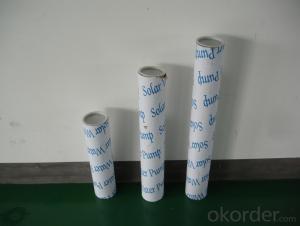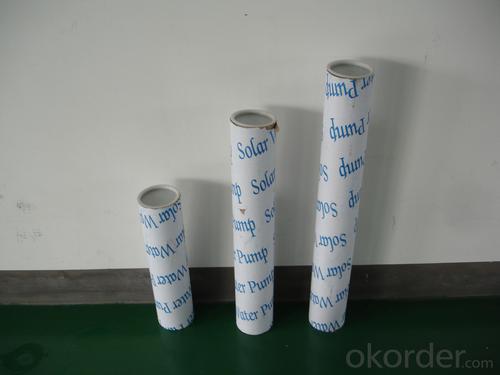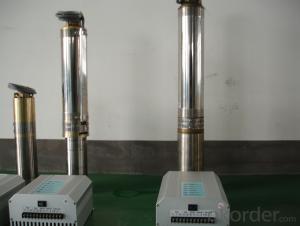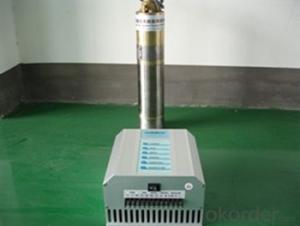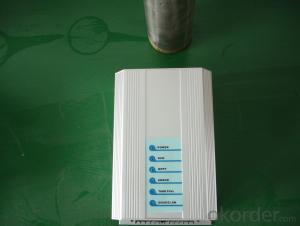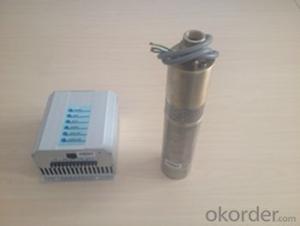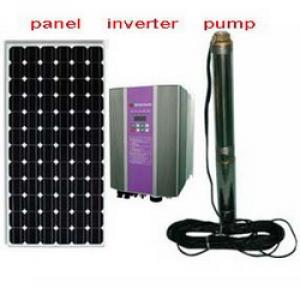DC Solar Water Pump for A Fountain
- Loading Port:
- China Main Port
- Payment Terms:
- TT OR LC
- Min Order Qty:
- -
- Supply Capability:
- -
OKorder Service Pledge
OKorder Financial Service
You Might Also Like
Item Description :
This superb new addition to our solar fountain range comes with a 10w solar panel,and a powerful fountain pump that is capable of producing fountains of up to 2m in height. As well as being easy to set up and use.Instruction manual is supplied for assembly and maintenance.
Solar Fountain Key Features :
Powered by direct sunlight
No high voltage electric mains required
Safe for children
Max. height of fountain: 2M
Max. flow capacity: 800 L/H(176 GAL)
10W Polycrystalline solar panel included
18V DC brushless pump
Solar Pump Features :
Can produce fountains up to : 2M (tube height) 1.4M (fountain height)
Comes with multiple nozzle accessories
Cable Length : 5M
Solar Panel Features :
10W peak power.
Polycrystalline highly efficient solar panel
Comes mounted in aluminium frame
Comes with ground stake and rotating knob so you can angle your panel toward the sun
What You Will Get :
10W solar panel
Solar pump
Ground Sake
Nozzle accessories
Precautions :
DO NOT alter or change the product itself or its components
Operate pump in freshwater only, never above 50 degrees celsius
Keep away from flammable liquids
Do not connect to any other power supply other than the included
- Q: How does a solar pump handle fluctuations in water demand?
- A solar pump handles fluctuations in water demand by adjusting its output based on the available sunlight and the system's design. When there is ample sunlight, the solar panels generate more power, allowing the pump to work at its maximum capacity. During periods of low sunlight or increased water demand, the pump may not be able to meet the full demand, but it will still operate at a reduced capacity to deliver water as efficiently as possible.
- Q: Can a solar pump be used for water supply in off-grid cabins or cottages?
- Yes, a solar pump can be used for water supply in off-grid cabins or cottages. Solar-powered water pumps are a sustainable and reliable solution for providing water in remote locations where grid power is not available. They utilize solar energy to power the pump, allowing for an independent and environmentally-friendly water supply system in off-grid settings.
- Q: What are the different types of solar pumps?
- There are primarily three types of solar pumps commonly used: submersible solar pumps, surface solar pumps, and solar pool pumps.
- Q: Are solar pumps suitable for commercial use?
- Yes, solar pumps are suitable for commercial use. They offer a sustainable and cost-effective solution for various commercial applications such as agriculture, irrigation, water supply, and industrial processes. Solar pumps eliminate the need for grid electricity or fuel, reducing operational costs and environmental impact. They are reliable, durable, and can be customized to meet the specific requirements of commercial operations.
- Q: Can a solar pump be used for water circulation in fountains or decorative features?
- Yes, a solar pump can be used for water circulation in fountains or decorative features. Solar pumps are designed to operate using energy from the sun, eliminating the need for electricity or batteries. They are efficient and eco-friendly, making them suitable for powering water features such as fountains, birdbaths, and decorative ponds.
- Q: How does the cleanliness of the solar panels affect the performance of a solar pump system?
- The performance of a solar pump system is greatly affected by the cleanliness of its solar panels. These panels are specifically designed to convert sunlight into electricity, which is essential for powering the pump system. However, the efficiency of the panels significantly decreases when they become dirty or covered in dust, leaves, bird droppings, or other debris. When dirt and debris accumulate on the surface of the solar panels, they obstruct the sunlight from reaching the photovoltaic cells. As a result, the cells are unable to generate electricity effectively. This leads to a decrease in the overall power output of the solar panels, directly impacting the performance of the pump system. Insufficient power may cause the pump to operate below its optimal levels, resulting in reduced water flow or even complete system failure. To maintain the efficiency and performance of solar panels, regular cleaning and maintenance are essential. Cleaning the panels removes dirt, dust, and other debris, allowing maximum sunlight to reach the photovoltaic cells. This ensures that the panels can generate the necessary electricity to power the pump system efficiently. In areas with high levels of air pollution or dusty environments, it may be necessary to increase the frequency of cleaning. Neglecting regular cleaning can lead to a significant decrease in the performance of the solar pump system, resulting in operational inefficiencies and higher energy costs. In conclusion, the cleanliness of solar panels directly affects the performance of a solar pump system. Regular cleaning and maintenance are crucial to ensure optimal power generation and efficient operation of the pump system. By keeping the panels clean, the system can operate at its full potential and provide a consistent water flow for various applications.
- Q: Are there any limitations on the vertical distance water can be pumped with a solar pump?
- Yes, there are limitations on the vertical distance water can be pumped with a solar pump. The maximum vertical distance that water can be pumped depends on factors such as the power and efficiency of the solar pump, the size and diameter of the pipes, and the atmospheric pressure. Typically, solar pumps have a maximum lift capacity of around 100 to 500 feet, but this can vary depending on the specific system and conditions.
- Q: Can a solar pump be used in areas with high levels of fluoride in the water?
- Yes, a solar pump can be used in areas with high levels of fluoride in the water. Solar pumps are primarily used to lift water from a source, such as a well or a borehole, and are not directly affected by the quality or composition of the water being pumped. However, it is important to note that a solar pump alone cannot remove or reduce fluoride levels in water. Additional water treatment methods may be required to address high fluoride concentrations if necessary.
- Q: Can solar pumps be used for water supply in military or defense applications?
- Yes, solar pumps can be used for water supply in military or defense applications. Solar-powered water pumps offer several advantages such as being self-sufficient, reliable, and environmentally friendly. They can provide a consistent and independent water supply, enabling military personnel to access water even in remote or off-grid areas. Additionally, solar pumps can operate quietly, reducing the risk of detection in sensitive operations. Overall, solar pumps are a viable option for fulfilling water supply needs in military or defense applications.
- Q: Can a solar pump be used for water supply in a school or educational institution?
- Yes, a solar pump can definitely be used for water supply in a school or educational institution. Solar pumps are an eco-friendly and cost-effective solution that can provide a reliable source of water for various purposes such as drinking, sanitation, and irrigation. They can be easily installed and operated, requiring minimal maintenance and no electricity costs. Additionally, using a solar pump aligns with the principles of sustainability and renewable energy, which can be taught and promoted within an educational setting.
Send your message to us
DC Solar Water Pump for A Fountain
- Loading Port:
- China Main Port
- Payment Terms:
- TT OR LC
- Min Order Qty:
- -
- Supply Capability:
- -
OKorder Service Pledge
OKorder Financial Service
Similar products
Hot products
Hot Searches
Related keywords
